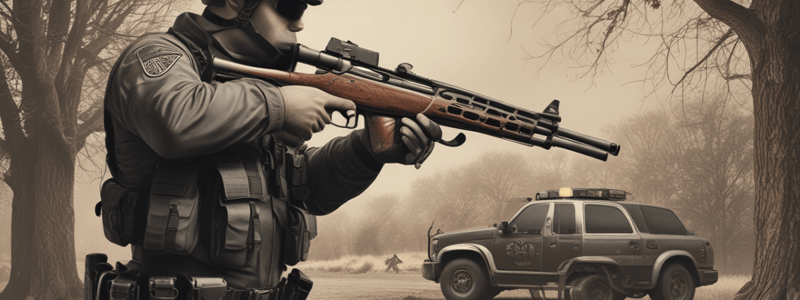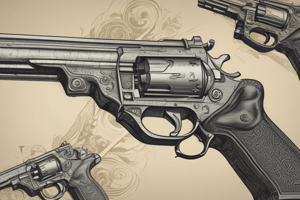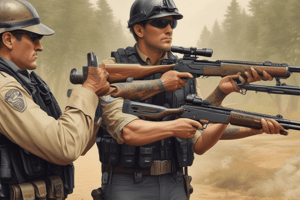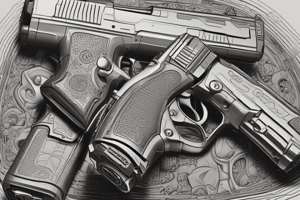Podcast
Questions and Answers
What is the primary goal of the lesson plan regarding shotguns in law enforcement?
What is the primary goal of the lesson plan regarding shotguns in law enforcement?
- To emphasize the importance of regular shotgun maintenance
- To teach recruits how to handle shotguns safely (correct)
- To familiarize recruits with various types of shotguns
- To introduce recruits to the Remington 870 and Mossberg shotguns
What is the focus of objective 3 in the lesson plan?
What is the focus of objective 3 in the lesson plan?
- Inspecting and cleaning the shotgun
- Identifying shotgun nomenclature
- Loading the shotgun in a combat situation
- Demonstrating the field disassembly procedure (correct)
What aspect of shotgun operation is emphasized in objective 12?
What aspect of shotgun operation is emphasized in objective 12?
- The five fundamentals of marksmanship (correct)
- Proper loading procedures
- Combat situation protocols
- Shotgun maintenance and cleaning
How many hours are allocated for this lesson plan?
How many hours are allocated for this lesson plan?
What is the purpose of objective 7 in the lesson plan?
What is the purpose of objective 7 in the lesson plan?
What is the date when this lesson plan was prepared?
What is the date when this lesson plan was prepared?
What is the primary purpose of checking the chamber and magazine tube during the safety procedure?
What is the primary purpose of checking the chamber and magazine tube during the safety procedure?
What is the function of the cartridge interrupter/cartridge stop assembly arms during the inspection process?
What is the function of the cartridge interrupter/cartridge stop assembly arms during the inspection process?
What is the primary difference between pump-action shotguns and semi-automatic shotguns?
What is the primary difference between pump-action shotguns and semi-automatic shotguns?
What should be done if a part or item appears to be damaged or extremely worn during the inspection process?
What should be done if a part or item appears to be damaged or extremely worn during the inspection process?
What is the purpose of the function testing process after re-assembly?
What is the purpose of the function testing process after re-assembly?
What is the primary function of the ejection port in pump-action shotguns?
What is the primary function of the ejection port in pump-action shotguns?
What is the purpose of the breech block in the shotgun's operational characteristics?
What is the purpose of the breech block in the shotgun's operational characteristics?
What should the recruit do during the disassembly procedure?
What should the recruit do during the disassembly procedure?
What should be used during the inspection or function test process?
What should be used during the inspection or function test process?
What is the purpose of the action release mechanism in the shotgun's operational characteristics?
What is the purpose of the action release mechanism in the shotgun's operational characteristics?
What is the approximate spread of the 00' Buck,.33 caliber at a distance of 1 yard?
What is the approximate spread of the 00' Buck,.33 caliber at a distance of 1 yard?
At what distance will the Rifled Slug, 1 ounce of lead,.72 caliber penetrate most metal objects?
At what distance will the Rifled Slug, 1 ounce of lead,.72 caliber penetrate most metal objects?
What is the primary purpose of the Rifled Slug, 1 ounce of lead,.72 caliber?
What is the primary purpose of the Rifled Slug, 1 ounce of lead,.72 caliber?
In what direction should the muzzle be pointed during the Assembly Area Load procedure?
In what direction should the muzzle be pointed during the Assembly Area Load procedure?
What is the first step in the Assembly Area Load procedure?
What is the first step in the Assembly Area Load procedure?
What is the correct location for the ammunition during the Combat Loading Procedure for a right-handed shooter?
What is the correct location for the ammunition during the Combat Loading Procedure for a right-handed shooter?
What is the correct hand position for loading the first round during the Combat Loading Procedure Option #1?
What is the correct hand position for loading the first round during the Combat Loading Procedure Option #1?
What is the correct action to take after loading the first round during the Combat Loading Procedure Option #1?
What is the correct action to take after loading the first round during the Combat Loading Procedure Option #1?
What is the primary difference between the Combat Loading Procedure Option #1 and Option #2?
What is the primary difference between the Combat Loading Procedure Option #1 and Option #2?
Why should the shooter watch the target or problem area during the Combat Loading Procedure?
Why should the shooter watch the target or problem area during the Combat Loading Procedure?
When loading a semiautomatic shotgun, what is the correct action to take after inserting the shell into the ejection/load port?
When loading a semiautomatic shotgun, what is the correct action to take after inserting the shell into the ejection/load port?
What is the correct procedure for unloading a shotgun in the Assembly Area?
What is the correct procedure for unloading a shotgun in the Assembly Area?
What is the correct way to carry ammunition as a left-handed shooter?
What is the correct way to carry ammunition as a left-handed shooter?
What is the purpose of the cartridge stop in the unloading procedure?
What is the purpose of the cartridge stop in the unloading procedure?
What is the correct procedure for unloading a semiautomatic shotgun in a combat load position?
What is the correct procedure for unloading a semiautomatic shotgun in a combat load position?
What is the correct procedure for loading a shotshell into the ejection port?
What is the correct procedure for loading a shotshell into the ejection port?
What is the correct way to hold the shotshell when loading a semiautomatic shotgun?
What is the correct way to hold the shotshell when loading a semiautomatic shotgun?
What is the purpose of the bolt release in loading a semiautomatic shotgun?
What is the purpose of the bolt release in loading a semiautomatic shotgun?
What is the correct procedure for removing remaining shells from the magazine tube?
What is the correct procedure for removing remaining shells from the magazine tube?
What is the correct stance when unloading a shotgun in a combat load position?
What is the correct stance when unloading a shotgun in a combat load position?
Flashcards are hidden until you start studying
Study Notes
Shotgun Introduction
- The two most common shotguns used by law enforcement agencies in Jefferson and St. Louis Counties are the Remington 870 and the Mossberg shotguns.
Safety Principles
- Always treat the weapon as if it is loaded until you have verified that it is safe.
- Check the following areas to verify that the weapon is unloaded and safe: Safety on Chamber (Action open), Shell carrier/elevator, Magazine tube.
- Use only dummy rounds when performing any inspection or function test.
Nomenclature
- The following are the parts of a shotgun:
- Muzzle
- Front sight
- Barrel
- Magazine Cap
- Magazine Tube
- Action Bars
- Chamber
- Ejection/Load Port
- Magazine Loading Port
- Shell Carrier/Elevator
- Breech Block
- Receiver Assembly
- Trigger
- Trigger Guard
- Safety
- Stock
- Fore-end
- Action Release Mechanism
Operational Characteristics
- Pump Action Shotguns:
- Operate by a working slide that opens the action, extracts and ejects a fired shell, and cocks the hammer.
- Most pump-action weapons have an ejection port on the right side and a cross bolt safety in the trigger guard.
- Semi-automatic Shotguns:
- Do not require any "pumping" action to fire, extract, and feed rounds.
- Delayed blowback and recoil are the two most common operational types of semi-automatic shotguns.
Disassembly, Inspection, and Cleaning Procedure
- Follow manufacturer recommendations for the particular make and model of shotgun used.
- Check the following during inspection:
- Cartridge interrupter/cartridge stop assembly arms
- Firing pin/bolt assembly (extractor)
- Ejector mechanism
- Action arm/forearm assembly
- Trigger assembly (elevator — carrier assembly)
- Barrel assembly (to include front sight)
- Magazine tube follower/spring assembly
- Magazine tube (damage and tightness)
Function Testing
- Follow manufacturer recommendations for the particular make and model of shotgun used.
- Check the operation of the safety:
- Place safety to "on" (safe position)
- Close action
- Pull trigger — hammer should not fall
- Place safety in "off" (fire position)
- Pull trigger — hammer should fall
Ammunition
- Common shotgun ammunition includes:
- "00" Buck: .33 caliber, penetration of 25 feet, spread of approximately 1 inch per yard, combat range of approximately 15-18 yards
- Rifled Slug: 1 ounce of lead, .72 caliber, penetration of 100 feet, effective range of approximately 75 yards, average marksman
Inspection and Loading Procedure (Assembly Area Load)
- Grasp shotgun with dominant hand on the pistol grip area
- Point muzzle in safe direction
- Open slide, inspect chamber, carrier/elevator, and magazine tube for any live ammunition
- Load to maximum capacity into magazine tube
- In this loading procedure, the chamber of the weapon remains empty and the weapon is de-cocked
Combat Loading Procedure
- Right-Handed Loading Procedure:
- Hold shotgun in the shoulder-fired position with the strong hand
- Muzzle is pointed in direction of problem with barrel parallel to the ground
- Ammunition should be carried on the left side of a right-handed shooter
- Load the first round into the ejection port
- Remaining rounds will be loaded into the loading port
- Left-Handed Loading Procedure:
- Hold weapon in dominant hand and load with right hand
- Ammunition should be carried on the right side of a left-handed shooter
- Load the first round into the ejection port
- Remaining rounds will be loaded into the loading port
Unloading the Shotgun
- Unload according to manufacturer recommendation and training center policies
- Assembly Area Unloading:
- Grasp fore-end with support hand
- Strong hand grasps receiver over trigger guard with index finger depressing action release
- Fore-end is slowly moved rearward to open action
- Remove shells from the magazine tube
- Combat Load Unloading:
- Point muzzle in safe direction, keeping weapon barrel parallel to the ground in a hip shooting position
- Slowly open action by moving slide to the rear
- Remove shell from ejection port
- Remaining shells in magazine tube can be removed
Five Fundamentals of Marksmanship
- The five fundamentals are:
- Stance
- Grip
- Sighting
- Trigger Action
- Breathing
Malfunctions and Clearance
- Identify most common malfunctions:
- Failure to Fire
- Failure to Unlock
- Failure to Extract
- Failure to Eject
- Failure to Feed
- Double Feed
- Failure to Fully Close
- Corrective actions for each malfunction are outlined in the text
Studying That Suits You
Use AI to generate personalized quizzes and flashcards to suit your learning preferences.




